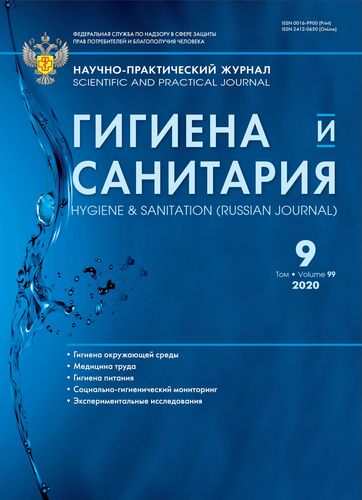Application of assessment of deviations of hematological indices as a sign of destabilization of homeostasis in greenhouse workers
- Авторлар: Vlasova N.V.1, Gainullina M.K.1, Masyagutova L.M.1, Gimranova G.G.1, Khairullin R.U.1, Sadrtdinova G.R.1
-
Мекемелер:
- Ufa Institute of Occupational Health and Human Ecology
- Шығарылым: Том 99, № 9 (2020)
- Беттер: 951-955
- Бөлім: OCCUPATIONAL HEALTH
- ##submission.datePublished##: 20.10.2020
- URL: https://vestnik.nvsu.ru/0016-9900/article/view/640261
- DOI: https://doi.org/10.47470/0016-9900-2020-99-9-951-955
- ID: 640261
Дәйексөз келтіру
Толық мәтін
Аннотация
Introduction. Sustainable socio-economic development of any country depends on the state of its labor resources, the quality of which is determined by the number and level of health of the working-age population. The current stage of development of society is characterized by the need to increase the efficiency of agriculture. An important role in the implementation of this task belongs to greenhouses.
Purpose. To investigate the hematological indices in greenhouse workers and determine their significance as early signs of the destabilization of homeostasis and the development of occupational diseases.
Material and methods. In the present work, laboratory studies were conducted on greenhouse workers.
Results. A routine laboratory examination of workers in the greenhouse economy was found to show abnormalities in the blood system. The average hemoglobin level in the main group was 106.00 ± 9.04 g/l. White blood changes in the form of neutrophilic leukocytosis were detected in 8.82 ± 3.46%, lymphocytosis in 39.71 ± 5.98%, eosinophilia in 14.71 ± 4.33% of all examined individuals of the main group.
Discussion. Significant changes were revealed to be depending on the duration of exposure to adverse factors and manifested by the formation of an anemic syndrome, lymphocytosis, increased allergization, severe thrombocytopenia.
Conclusion. The results obtained can serve as one of the criteria for the early diagnosis of chronic intoxication.
Авторлар туралы
Natalya Vlasova
Ufa Institute of Occupational Health and Human Ecology
Хат алмасуға жауапты Автор.
Email: vnv.vlasova@yandex.ru
ORCID iD: 0000-0003-3926-0937
MD, Ph.D., Ufa Institute of Occupational Health and Human Ecology, Ufa, 450106, Russia.
e-mail: vnv.vlasova@yandex.ru
РесейM. Gainullina
Ufa Institute of Occupational Health and Human Ecology
Email: noemail@neicon.ru
ORCID iD: 0000-0001-9340-2284
Ресей
L. Masyagutova
Ufa Institute of Occupational Health and Human Ecology
Email: noemail@neicon.ru
ORCID iD: 0000-0003-0195-8862
Ресей
G. Gimranova
Ufa Institute of Occupational Health and Human Ecology
Email: noemail@neicon.ru
ORCID iD: 0000-0002-8476-1223
Ресей
R. Khairullin
Ufa Institute of Occupational Health and Human Ecology
Email: noemail@neicon.ru
ORCID iD: 0000-0001-6643-0220
Ресей
G. Sadrtdinova
Ufa Institute of Occupational Health and Human Ecology
Email: noemail@neicon.ru
ORCID iD: 0000-0002-1530-5312
Ресей
Әдебиет тізімі
- Popova A.Yu. Issues and trends in occupational morbidity of agricultural workers of the Russian Federation. Zdorov’e naseleniya i sreda obitaniya. 2016; (9): 4–9. (in Russian)
- Migacheva A.G., Novikova T.A., Spirin V.F. Current issues of reducing occupational risk and health growers greenhouse. Meditsina truda i promyshlennaya ekologiya. 2015; (9): 96. (in Russian)
- Yatsenko L.A., Borisov N.A., Klepikov O.V. Hygienic assessment of occupational risk factors for the health of greenhouse workers. Sanitarnyy vrach. 2018; (10): 45–54. (in Russian)
- Yatsyna D.S., Borisova L.S. Evaluation of health workers greenhouse farms. Prikladnye informatsionnye aspekty meditsiny. 2016; 19(4): 101–11. (in Russian)
- Mamchik N.P., Zhurikhina E.A., Borisova L.S. Hygienic assessment of safety and health workers agricultural enterprises (greenhouse facilities). Sistemnyy analiz i upravlenie v biomeditsinskikh sistemakh. 2014; 13(1): 93–7. (in Russian)
- R 2.2.2006-05. Guidelines for the hygienic assessment of factors working environment and labor process. Criteria and classification of working conditions. Moscow; 2005. (in Russian)
- Bakirov A.B., Shaykhlislamova E.R., Gaynullina M.K., Masyagutova L.M., Khafizova A.S., Churmantaeva S.Kh., et al. Specific features of occupational morbidity of Bashkortostan agricultural workers under modern conditions. In: Popova A.Yu., Bakirov A.B., eds. Materials of All-Russian Conference with International Participation «Modern Problems of Hygiene and Occupational Medicine» [Materialy Vserossiyskoy konferentsii s mezhdunarodnym uchastiem «Sovremennye problemy gigieny i meditsiny truda»]. Ufa; 2015: 283–89. (in Russian)
- Dubovaya N.I. Indicators of the case rate and condition of the immuno-biochemical homeostasis at greenhouses depending on the professional experience. Rossiyskiy mediko-biologicheskiy vestnik imeni akademika I.P. Pavlova. 2010; 18(4): 68–73. (in Russian)
- Ahmadi N., Mandegary A., Jamshidzadeh A., Mohammadi-Sardoo M., Mohammadi-Sardo M., Salari E., et al. Hematological abnormality, oxidative stress, and genotoxicity induction in the greenhouse pesticide sprayers; investigating the role of NQO1 gene polymorphism. Toxics. 2018; 6(1): 13. https://doi.org/10.3390/toxics6010013
- García-García C.R., Parrón T., Requena M., Alarcón R., Tsatsakis A.M., Hernández A.F. Occupational pesticide exposure and adverse health effects at the clinical, hematological and biochemical level. Life Sci. 2016; 145: 274–83. https://doi.org/10.1016/j.lfs.2015.10.013
- Bondarchuk S.V., Tyrenko V.V., Mikhaleva M.A., Yurkin A.K. Cellular blood composition: hemogram healthy individuals in Saint Petersburg. Geny i kletki. 2016; 11(3): 2016: 129–34. (in Russian)
- Timasheva G.V., Valeeva O.V., Badamshina G.G., Fagamova A.Z. Integrated hematological indicators and their use in the diagnosis of toxic effects of chemical factors on the body of workers in modern chemical production. In: Onishchenko G.G., ed. All-Russian Scientific and Practical Conference of Young Scientists and Specialists of Research Organizations of Rospotrebnadzor «Actual Problems of Preventive Medicine, the Environment and Public Health» [Vserossiyskaya nauchno-prakticheskaya konferentsiya molodykh uchenykh i spetsialistov nauchno-issledovatel’skikh organizatsiy Rospotrebnadzora «Aktual’nye problemy profilakticheskoy meditsiny, sredy obitaniya i zdorov’ya naseleniya»]. Ufa; 2013: 207–12. (in Russian)
Қосымша файлдар







